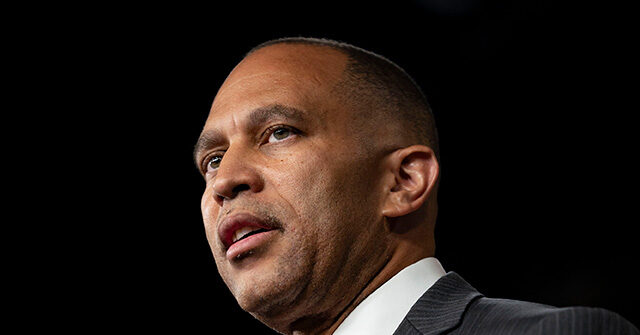On a recent episode of CNN’s “The Source,” House Minority Leader Rep. Hakeem Jeffries (D-NY) expressed concerns about the potential for conflict between Republicans and Democrats if Republicans push what he termed “far-right extremism.” He highlighted the risks associated with tax cuts that primarily benefit the wealthy and well-connected, indicating that such actions could create significant governmental challenges in how the two parties cooperate. This comment signals a willingness from the Democratic side to engage in bipartisan dialogue, provided that Republican policies align more closely with the needs of working and middle-class Americans rather than favoring the affluent.
In a discussion with host Kaitlan Collins, Jeffries acknowledged past instances of cooperation between Democrats and Republicans, particularly when the focus was on preventing government shutdowns and managing the national debt. However, he emphasized that the future of this partnership hinges on how Republicans choose to navigate the evolving political landscape. He asserted that while Democrats are open to collaboration aimed at solving problems for American taxpayers, any movement towards far-right policies or sweeping tax cuts would not be met with the same cooperative spirit. This perspective illustrates the precarious nature of bipartisanship in a polarized political environment.
Jeffries argued that the notion of a broad mandate for extreme conservative policies is misplaced. He contended that the American public does not support radical measures that disproportionately benefit the wealthy. According to him, a significant segment of the population seeks tangible improvements to their economic situation and social conditions. Therefore, any attempts by Republicans to push through policies without considering the average American’s needs could backfire, potentially resulting in increased tension in the legislative process.
The Minority Leader strongly indicated that a collaborative relationship with Republicans is contingent upon their willingness to address the issues affecting working-class and aspiring middle-class individuals. If Republicans are ready to prioritize these groups in their policy decisions, Jeffries assured that House Democrats would be eager to partner with them to achieve meaningful legislative outcomes. This conditional collaboration highlights the Democrats’ strategic aim of negotiating from a position of principle while remaining open to compromise on agreeable terms.
Moreover, Jeffries’ stance underscores a broader narrative concerning the Democratic party’s identity as it seeks to navigate bipartisan efforts amidst varying political ideologies within the Republican party. While the Democrats maintain their commitment to defending the interests of the middle class, the negotiation terms will undoubtedly depend on the nature and intentions of the Republican agenda in the new Congress. Jeffries’ statements reflect both caution and hope, suggesting that productive dialogue can still be achieved, but only if the Republican approach is rooted in the principles of equity and fairness.
Ultimately, the future political landscape will likely be shaped by this complex interplay of cooperation and conflict, as both parties grapple with the expectations of their constituents. The upcoming interactions in Congress will test the limits of bipartisanship as leaders like Jeffries strive to maintain a balance between advocating for progressive policies and engaging in practical governance with their Republican counterparts. If the two sides can establish a working relationship based on mutual respect and understanding, it could pave the way for significant advancements in addressing the pressing issues facing the American populace.

